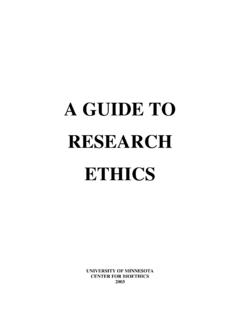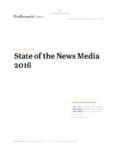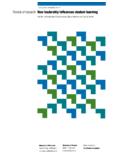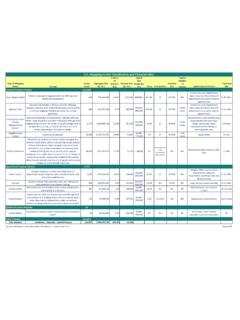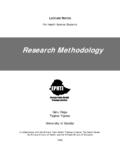Transcription of RESEARCH PARADIGMS - Center for Homeland Defense and …
1 RESEARCH PARADIGMS LAUREN F. WOLLMAN, PHD Center FOR Homeland Defense AND SECURITY DEPT. OF NATIONAL SECURITY AFFAIRS NAVAL POSTGRADUATE SCHOOL Slide 1 Opening Credits Music Slide 2 RESEARCH PARADIGMS RESEARCH PARADIGMS by Lauren F. Wollman, PhD Slide 3 Reseach PARADIGMS Most kinds of RESEARCH fall into one of the following PARADIGMS : Descriptive, Evaluative, Prescriptive, Exploratory, or Predictive. These PARADIGMS have to do with the purpose of the RESEARCH . Various methods can be used to do the RESEARCH , but it is first useful to determine the overarching objective of the RESEARCH . In this module, we will provide a description of each paradigm and also present some examples of the kinds of RESEARCH questions that are typically associated with them.
2 Slide 4 Descriptive Descriptive RESEARCH focuses on investigating and mapping (describing) problems, processes, relationships (especially causal relationships), or other existing phenomena. For example, a thesis that focused on understanding how information is disseminated from a fusion Center to local police departments and where the barriers exist to the flow of information would fall under this type of RESEARCH . A case study unpacking all aspects of a single event in order to identify the characteristics, dynamics, and chronology and to discern cause and effect could also be descriptive in purpose. RESEARCH questions for theses involving descriptive RESEARCH usually ask what happened, what the relationship is between one thing and another, or what we know about something.
3 Think of this paradigm as a camera, taking snapshots or video of something that hasn t been studied before. Slide 5 Evaluative Evaluative RESEARCH is concerned with the assessment of policies, programs or institutional frameworks. Evaluative RESEARCH evaluates: it judges, assesses, or measures something in relation to outcomes or requirements. If you want to know how well a policy has worked, or how well a program is performing, or whether a practice is effective or successful, or what the outcomes of a given policy are, you re doing Evaluative RESEARCH . RESEARCH questions in Evaluative RESEARCH ask measurement or performance questions like How much , how well , or outcome questions pertaining to impact or results.
4 Think of this paradigm as a scale or calculator, measuring something s characteristics, growth, or performance. Slide 6 Prescriptive Prescriptive RESEARCH , like Evaluative RESEARCH , is applied rather than theoretical. It differs from Evaluative RESEARCH in that it goes a step further, beyond identifying success or performance or outcomes, and actually recommends solutions or new ideas. Prescriptive RESEARCH (also known as Normative RESEARCH ), comes up with an assertion, a solution, a proposal for how to address a known problem space. The implication of most RESEARCH questions in Prescriptive RESEARCH is what we should do now: how a policy should be changed or improved; how an organization can achieve specific outcomes or meet requirements; a set of recommendations or solutions or ideas that involve change and action.
5 The RESEARCH question in Prescriptive RESEARCH often uses words like can and should How can we accomplish/improve/change x , or what should we do now about x ? For this reason, you can think of Prescriptive as symbolized by a doctor s prescription pad, writing out the fix for an ailment. Slide 7 Exploratory Exploratory RESEARCH concerns itself with looking at (exploring) issues or problems that are entirely or largely uncharted and that are usually not even well-defined. Exploratory RESEARCH can even conclude that a presumed phenomenon does not exist. Its contribution is in clarifying and shedding light on murky issues, looking for patterns or evidence, exploring an idea.
6 RESEARCH questions that indicate Exploratory RESEARCH are worded to ask whether something exists, or to attempt to make sense of an unclear, wicked, or emerging issue. It is often for this reason called Sense-making RESEARCH . A good way to think of the Exploratory paradigm is a divining rod or sonar machine, looking for signs of something sometimes we know what it is we re looking for, sometimes not. But it s an open-ended search. Slide 8 Predictive Predictive RESEARCH is chiefly concerned with forecasting (predicting) outcomes, consequences, costs, or effects. This type of RESEARCH tries to extrapolate from the analysis of existing phenomena, policies, or other entities in order to predict something that has not been tried, tested, or proposed before.
7 A Predictive RESEARCH project often asks how - or how well something might work, or what the impact of something might be. Whereas Prescriptive (Normative) RESEARCH makes applicable and tangible recommendations, Predictive RESEARCH is often more hypothetical, theoretical, or experimental it concerns ideas that haven t been tried, might not be testable, or didn t previously exist. The Predictive paradigm is a lot like a crystal ball trying to tell the future of something. Slide 9 Closing Credits Music

